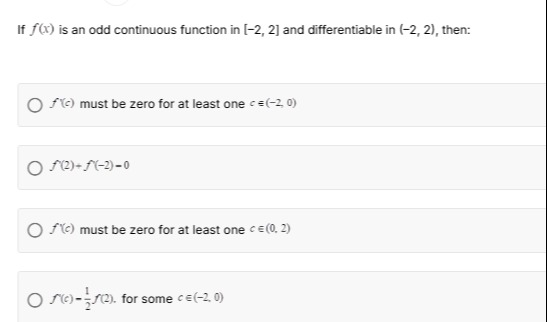Question
Question: If f(x) is an odd continuous function in [-2, 2] and differentiable in (-2, 2), then:...
If f(x) is an odd continuous function in [-2, 2] and differentiable in (-2, 2), then:

f'(c) must be zero for at least one c in (-2, 0)
f'(2)+f'(-2)=0
f'(c) must be zero for at least one c in (0, 2)
f'(c)=1/2 * f(2), for some c in (-2, 0)
f'(c)=1/2 * f(2), for some c in (-2, 0)
Solution
Given that f(x) is an odd function, we know that f(−x)=−f(x) for all x in its domain. Differentiating both sides with respect to x, we get: dxdf(−x)=dxd(−f(x)) Using the chain rule on the left side: f′(−x)⋅(−1)=−f′(x) −f′(−x)=−f′(x) f′(−x)=f′(x) This shows that the derivative f′(x) is an even function.
Also, for an odd function, f(0)=0. This is because f(−0)=−f(0), which implies f(0)=−f(0), so 2f(0)=0, hence f(0)=0.
Now let's analyze the options:
-
Option 1 & 3: For f(x)=x, which is an odd, continuous, and differentiable function, its derivative is f′(x)=1. This derivative is never zero for any c in (−2,0) or (0,2). Thus, these statements are false.
-
Option 2: f′(2)+f′(−2)=0. Since f′(x) is an even function, f′(−2)=f′(2). Substituting this into the equation gives: f′(2)+f′(2)=0 2f′(2)=0 f′(2)=0 This implies that the derivative of any odd function must be zero at x=2. Consider f(x)=x3. This is an odd function, and its derivative is f′(x)=3x2. At x=2, f′(2)=3(22)=12=0. Thus, this statement is false.
-
Option 4: f′(c)=21f(2), for some c∈(−2,0). We can apply the Mean Value Theorem (MVT) to the function f(x) on the interval [−2,0]. Since f(x) is continuous on [−2,0] and differentiable on (−2,0), the MVT guarantees that there exists at least one c∈(−2,0) such that: f′(c)=0−(−2)f(0)−f(−2) We know f(0)=0 and, since f is odd, f(−2)=−f(2). Substituting these values: f′(c)=0−(−2)0−(−f(2))=2f(2) This matches the statement in Option 4. Therefore, this statement is true.
